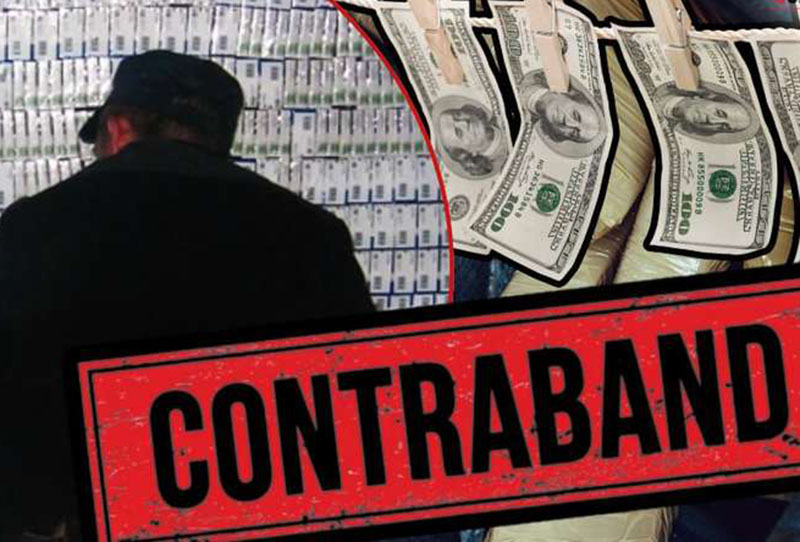Контрабанда в Украине: повлияет ли ужесточение уголовной ответственности на незаконную перевозку товаров


Контрабанда является одной из самых больших проблем экономики Украины, которая не только вредит государственному бюджету, но и поддерживает теневую экономику, порождает коррупцию и уголовные связи.
В контексте евроинтеграции и стремлений к улучшению контроля соблюдения законов, в 2024 году Украина усилила уголовную ответственность за контрабанду товаров, приняв закон, устанавливающий более жесткие наказания за этот вид преступлений. Согласно Закону Украины №3513-IX, с 1 июля 2024 года вступила в силу новая статья 201-3 Уголовного кодекса Украины, предусматривающая строгие санкции для тех, кто занимается незаконным перемещением товаров через таможенную границу страны.
Что такое контрабанда и ее влияние на экономику Украины
Контрабанда – это незаконное перемещение товаров через границы государства, которое осуществляется без соблюдения таможенных правил и уплаты причитающихся налогов и сборов. В случае Украины это явление не ново. Исторически из-за своей географической близости ко многим странам Европейского Союза и наличию протяженной границы со странами-соседями, Украина была и остается важным транзитным коридором для нелегальной торговли. Основными видами товаров, наиболее часто подлежащих контрабанде, являются табачные изделия, алкоголь, электроника, медикаменты, а также другие товары с высоким уровнем акциза.
Контрабанда наносит значительный ущерб государству. По данным Государственной таможенной службы Украины, государство ежегодно теряет миллиарды гривен из-за недополучения налоговых и таможенных пошлин, которые могли бы быть направлены на развитие инфраструктуры, здравоохранение, образование и т.д. Также контрабанда способствует развитию организованной преступности и коррупции, снижая доверие к правоохранительным органам и государственным институтам.
Новые законодательные изменения: ужесточение уголовной ответственности
1 июля 2024 г. вступила в силу новая статья 201-3 Уголовного кодекса Украины, которая значительно усиливает уголовную ответственность за контрабанду товаров. В частности, изменения предполагают:
— Штрафы от 10 000 до 75 000 не облагаемых налогом минимумов доходов граждан (что эквивалентно от 6,7 млн до 50 млн грн) за контрабанду товаров в значительных размерах.
— Лишение свободы на срок от 5 до 11 лет для лиц, совершающих контрабанду в большом размере или по предварительному сговору группой лиц.
— Конфискация имущества и лишение права занимать определенные должности сроком до 3 лет.
Эти изменения призваны не только повысить уровень ответственности для занимающихся контрабандой, но и решить ряд проблем, связанных с избеганием уголовной ответственности через лазейки в законодательстве. Важно отметить, что ответственность наступает только при условии наличия умысла, который имеет целью предотвратить злоупотребления со стороны правоохранительных органов и судебной системы.
Впрочем, народный депутат Ярослав Железняк считает принятие более жесткого законодательства по контрабанде товаров крайне противоречивое и опасное для бизнеса: «Новый закон усиливает возможности таможни влиять на любой бизнес. То есть ошибку в декларации может грозить тюремным заключением для предпринимателя. Во-вторых, он не решает проблему контрабанды, потому что это вопрос не только таможни.
Первые случаи применения нового закона
Одним из первых случаев применения новой статьи стало расследование контрабанды сырья для изготовления табачных изделий на сумму около 13 млн. гривен. Это произошло на пограничном пункте «Порубное-Сирет», где таможенники обнаружили незаконное перемещение товаров в грузовом отсеке автомобиля. Важно отметить, что подозреваемый пытался обойти таможенный контроль, воспользовавшись «зеленым коридором», являющимся типичным методом для контрабандистов, надеющихся избежать проверок.
Международный контекст: уголовная ответственность за контрабанду в ЕС
Украина не единственная страна, которая сталкивается с проблемой контрабанды. Европейский Союз также активно борется с этой проблемой. Согласно Директиве 2017/1371, в странах ЕС установлена уголовная ответственность за таможенные правонарушения, наносящие ущерб бюджету Союза. Например, в случае нанесения ущерба на сумму свыше 100 000 евро, минимальное наказание предусматривает лишение свободы на срок не менее 4 лет.
Максимальные сроки наказания за контрабанду в странах-членах ЕС варьируются, но в таких странах как Германия и Франция эти сроки могут достигать 10 лет лишения свободы. В Украине максимальное наказание составляет 12 лет с конфискацией имущества, соответствующего практикам ЕС.
Спрос рождает предложение
Контрабанда является частью большой теневой экономики Украины, и попытки борьбы с ней, не уничтожая другие цепи и этапы этой системы, не приведут к успеху. Основная проблема заключается не только в возможности избежать уплаты таможенных платежей, но и в том, что такие товары находят свой рынок сбыта в Украине.
Существование спроса на контрабандные продукты является главной причиной их массового ввоза. Именно возможность реализации внутри страны товаров, не прошедших таможенную очистку или ввезенных с нарушениями, поддерживает коррупционные схемы на таможне. Турецкие кроссовки, брендовые сумки или электроника – большая часть этого ассортимента попадает в Украину нелегально.
Попытки остановить контрабанду сталкиваются с тем, что такие товары пользуются высоким спросом у потребителей. Многие украинцы не видят проблем в покупке дешевых контрабандных товаров, не задумываясь о том, что их деньги поддерживают коррупционные схемы.
Возможна ли эффективная борьба?
Эффективная борьба с контрабандой возможна только в контексте широкой детенизации экономики страны. Контрабандные товары служат основой для многих других незаконных процессов, включая уклонение от налогов и использование фиктивных документов для финансовых махинаций. Документы, сопровождающие нелегальные товары могут использоваться для мошеннических схем с налогами, что создает целую экосистему коррупции.
Таким образом, борьба с контрабандой должна быть комплексной и включать не только таможню, но и внутренний рынок и налоговую систему. Только ликвидация всех звеньев теневой экономики сможет создать предпосылки для эффективного преодоления контрабанды.
Повлияли ли новые законы на сокращение контрабанды?
Введение новых законодательных норм стало важным шагом в борьбе с контрабандой. Уже через 2 месяца после начала их действия, поток контрабанды несколько снизился, отмечают на Государственной таможне. В частности, представители Ассоциации ритейлеров Украины отмечают значительные достижения в борьбе с теневым рынком, в частности на рынке табачной продукции, где теневая доля уменьшилась с 24% до 14,5% в августе 2024 года.
Однако следует отметить, что именно усиление ответственности не всегда является залогом снижения уровня правонарушений. Для эффективного применения закона необходимо обеспечить надлежащую работу правоохранительных органов, в частности, таможенной службы и Бюро экономической безопасности Украины.
Ключевым аспектом является создание условий для снижения мотивации к совершению контрабанды. Это включает в себя улучшение условий для легального бизнеса, снижение уровня коррупции и обеспечение прозрачности процедур таможенного контроля.
Дополнительно, важную роль будет играть международное сотрудничество, в частности со странами ЕС, для обмена информацией об организованных преступных группировках, занимающихся контрабандой. Совместные мероприятия и координация действий между правоохранительными органами разных стран смогут значительно улучшить эффективность борьбы с незаконным перемещением товаров через границы.
Ужесточение уголовной ответственности за контрабанду является важным шагом на пути к преодолению этого явления в Украине. Однако для достижения реальных результатов важно обеспечить надлежащую правоприменительную практику, основанную на прозрачности, эффективности работы таможенной и правоохранительной системы. Сможет ли новое законодательство существенно сократить уровень контрабанды, покажет время и результаты дальнейших расследований.
Recent Posts
Сбежавший в Швейцарию блогер Станислав Домбровский просит прощения у украинцев
Одесский трэш блогер Стас Домбровский, который в последнее время проживает в Швейцарии, записал видеообращение к…
Александра Устинова и атака на руководство АОЗ: что стоит за волной критики
Александра Устинова, народная депутат, которая в последние дни активно атакует Агентство оборонных закупок (АОЗ) возможно…
Журналисты показали имение киевской судьи, закрывшей дело Приходько
Свобода "под ключ" или манипуляция правосудием? Борис Приходько – нацбанкир времен Януковича и действующий нардеп…
Судьи вне закона
В течение последних трех лет внимание общественности если и бывает приковано к судам, то гораздо…
Артем Ляшанов и bill_line спасают репутацию через суд
Финтех-компания столкнулась с обвинениями в отмывании денег игорной мафии. ООО «Тех-Софт Атлас» (ТМ «bill_line») и…
Криптобиржа WhiteBIT: как Владимир Носов и «регионалы» Шенцевы отмывают деньги и помогают спецслужбам России
Владимир Носов в Украине пытается позиционировать себя как респектабельный бизнесмен и хозяин криптобиржи WhiteBIT. Однако…

